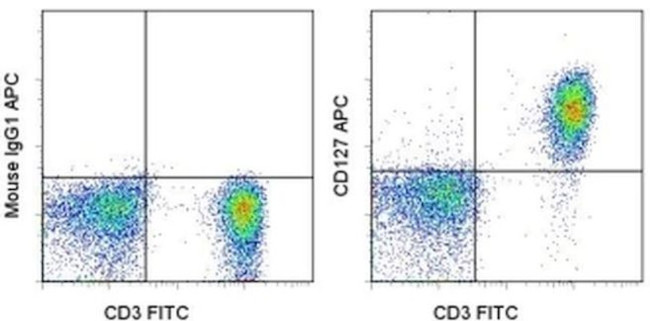Search Thermo Fisher Scientific
Invitrogen
CD127 Monoclonal Antibody (eBioRDR5), APC, eBioscience™
Product Details
17-1278-42
Species Reactivity
Published species
Host/Isotype
Recommended Isotype Control
Class
Type
Clone
Conjugate
Excitation/Emission Max
Form
Concentration
Purification
Storage buffer
Contains
Storage conditions
Shipping conditions
RRID
Product Specific Information
Description: The eBioRDR5 monoclonal antibody reacts with human CD127 (Interleukin-7 Receptor alpha). CD127 complexes with CD132, also known as the common gamma chain (gamma c), to form the multi-functional IL-7 receptor (IL-7R). CD127 is a type I glycoprotein with a molecular weight of 75-80 kDa and is expressed by immature B cells through the early pre-B stage, by thymocytes during several stages of their development, and on most mature T cells, with transient down-regulation upon activation. Binding of IL-7 results in signal transduction which occurs through several tyrosine kinase pathways including the Jak/STAT pathway. IL-7 is indispensible for the development of lymphocytes, and the control of homeostatic proliferation of T-cells in the periphery. In addition, IL-7R signaling is know to be involved in the regulation of T cell receptor (TCR) locus rearrangement in gamma delta T cells.
Interestingly, recently it has been demonstrated that CD127 expression is down-regulated on CD4+CD25+ regulatory T cells (T regs). While the co-expression of CD4 and CD25 has become widely used as an indicator of T regs, this method of identification may also include cells without suppressive activity. It has clearly been shown that CD4+CD25+ cells that have down-regulated the expression of CD127 are significantly more highly-enriched for the regulatory T population, as defined by expression of the T reg-specific transcription factor Foxp3 and the suppressive activity of these cells, in vitro.
Binding of the eBioRDR5 monoclonal antibody to PBMCs is blocked by pre-incubation of the cells with recombinant human IL-7 (Product # 14-1079-80).
Applications Reported: This eBioRDR5 antibody has been reported for use in flow cytometric analysis.
Applications Tested: This eBioRDR5 antibody has been pre-titrated and tested by flow cytometric analysis of normal human peripheral blood cells. This can be used at 5 µL (0.06 µg) per test. A test is defined as the amount (µg) of antibody that will stain a cell sample in a final volume of 100 µL. Cell number should be determined empirically but can range from 10^5 to 10^8 cells/test.
Excitation: 633-647 nm; Emission: 660 nm; Laser: Red Laser.
Filtration: 0.2 µm post-manufacturing filtered.
Target Information
CD127 (Interleukin-7, IL-7) is a glycoprotein involved in the regulation of lymphopoiesis. The response of cells to CD127 is dependent on the presence of the interleukin 7 receptor (IL7R); the active receptor is an alpha/gamma chain heterodimer. CD127 consists of an alpha chain and a gamma chain. The gamma(c) chain, which also associates with the interleukin-2 receptor, serves primarily to activate signal transduction by the IL7R complex, while the alpha chain of IL7R determines specific signaling events through its association with cytoplasmic signaling molecules. CD127 promotes the proliferation of precursor B cells, thymocytes, T cell progenitors, and mature CD4+ and CD8+ T cells. The biological effects of IL7 are mediated by the binding of IL7 to the specific cell surface receptor. Diseases associated with CD127 dysfunction include severe combined immunodeficiency and T cell negative/B cell negative/NK positive severe combined immunodeficiency.
For Research Use Only. Not for use in diagnostic procedures. Not for resale without express authorization.
How to use the Panel Builder
Watch the video to learn how to use the Invitrogen Flow Cytometry Panel Builder to build your next flow cytometry panel in 5 easy steps.
Bioinformatics
Protein Aliases: CD127; CD127 antigen; CDw127; IL 7 receptor; IL 7R a; IL 7R subunit alpha; IL 7R α; IL 7Ra; IL 7Rα; IL-7 receptor subunit alpha; IL-7R; IL-7R subunit alpha; IL7 receptor; IL7 receptor subunit alpha; IL7R a; IL7R alpha; IL7R subunit alpha; IL7R α; IL7Rα; interleukin 7 receptor alpha chain; interleukin 7 receptor isoform H5-6; Interleukin-7 receptor subunit alpha; Interleukin7 receptor subunit alpha; MGC107557; sCD127; soluble IL 7 receptor; soluble IL 7R
Gene Aliases: CD127; CDW127; IL-7R-alpha; IL7R; IL7RA; ILRA
UniProt ID: (Human) P16871
Entrez Gene ID: (Human) 3575

Performance Guarantee
If an Invitrogen™ antibody doesn't perform as described on our website or datasheet,we'll replace the product at no cost to you, or provide you with a credit for a future purchase.*
Learn more
We're here to help
Get expert recommendations for common problems or connect directly with an on staff expert for technical assistance related to applications, equipment and general product use.
Contact tech support


